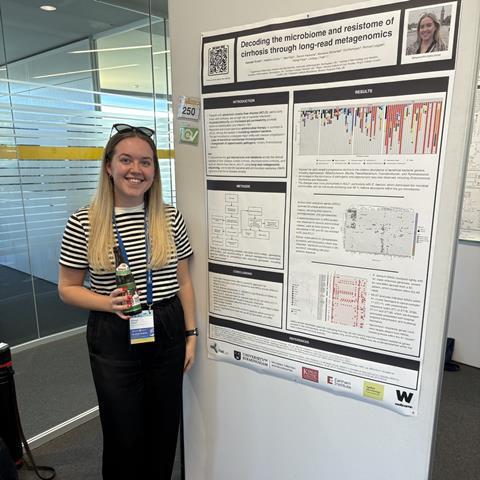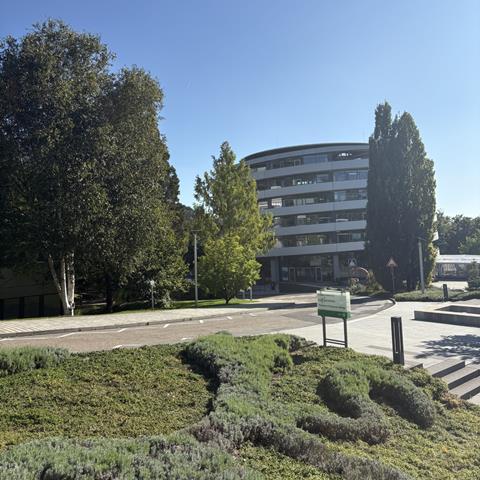Dr Hannah Trivett, University of Birmingham, reports back from EMBL Human Microbiome Conference held in Heidelberg, Germany, where she presented her research with the support of AMI’s Scientific Event Travel Grant.

I am deeply grateful to Applied Microbiology International for awarding me the Applied Microbiology International Travel Grant, which enabled me to attend and present my research at the EMBL Human Microbiome Conference held in Heidelberg, Germany.
This international conference brought together researchers from across the human microbiome field, including experts in infant health, cancer microbiome, mental health and gastrointestinal diseases, to name a few.
It was a fantastic opportunity to learn about the latest developments in microbiome research, exchange ideas with leading scientists, and gain inspiration for future projects, including new tools, experiments and collaborations.
Poster presentation
At the conference, I presented a poster titled “Decoding the microbiome and resistome of cirrhosis through long-read metagenomics” which demonstrated the application of long-read metagenomics as a pathogen- and sample-agnostic tool for microbial surveillance and clinical diagnostics.
I focused on patients with liver cirrhosis, a group that typically exhibits impaired immune function and increased intestinal permeability, placing them at heightened risk of recurrent and severe bacterial infections. These infections often necessitate repeated antimicrobial treatment as cirrhosis progresses.
Comparing the gut microbiomes of cirrhosis patients and healthy controls, I observed a marked increase in Enterococcus faecium in the patient cohort, alongside a significant depletion of beneficial keystone taxa. Additionally, advanced disease stages displayed an enrichment of clinically relevant AMR genes, which strongly correlated with prior antimicrobial exposure. These findings strengthen the potential of metagenomics to aid clinical decision-making by facilitating more informed antimicrobial selection based on the resistome and microbial composition.
Valuable feedback
Presenting my work to an international audience allowed me to engage in discussions and receive valuable feedback from experts in the field. Several attendees showed interest in my approach and offered constructive suggestions that will help refine my future investigations, which I have been in contact with since the conference, reinforcing the value of international conferences to help forge connections with collaborators.
READ MORE: Applied Microbiology International launches 2025 Grant Portfolio
READ MORE: A symbiotic gut fungus wards off liver disease in mice
The conference programme featured a wide range of sessions, from microbiome-host interactions to bioinformatics, metabolomics, and translational applications. I especially found talks highlighting the development of microbiome-based therapeutics and translational research inspiring, showing how academic work can be utilised for problems in the clinical space, such as antibiotic resistance, nutritional gaps and mental health. These talks not only provided scientific insights but also illustrated the broader societal relevance of microbiome research.
Professional networks
Beyond the scientific sessions, attending the Human Microbiome Conference gave me the chance to establish valuable professional networks with experts in the field whom I had not met previously.

Receiving the AMI Travel Grant was instrumental in making this experience possible, giving me the opportunity to travel to an international conference in Germany to speak with leaders in microbiome research. The experience has not only broadened my scientific knowledge but also strengthened my confidence in communicating my research to a global audience.
Renewed motivation and new ideas
I returned from Heidelberg with renewed motivation, new ideas for my project, and a deeper appreciation for the wider human microbiome field. I would like to sincerely thank Applied Microbiology International for their generous support. The travel grant provided me with an invaluable opportunity to share my work, learn from others, and grow as a researcher.
I am confident that the insights and connections gained through this conference will continue to shape my future research and professional journey.
Find out more about AMI’s grants.
Topics
- Antimicrobial Resistance
- Applied Microbiology International
- Bacteria
- Be inspired
- Community
- Early Career Research
- EMBL Human Microbiome Conference
- Enterococcus faecium
- Gut Microbiome
- Human Microbiome
- liver cirrhosis
- Metagenomic
- One Health
- People News
- resistome
- Scientific Event Travel Grant
- UK & Rest of Europe
- University of Birmingham







No comments yet